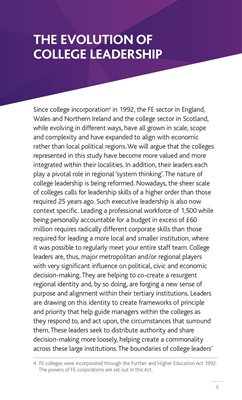
9
Since college incorporation4 in 1992, the FE sector in England,
Wales and Northern Ireland and the college sector in Scotland,
while evolving in different ways, have all grown in scale, scope
and complexity and have expanded to align with economic
rather than local political regions. We will argue that the colleges
represented in this study have become more valued and more
integrated within their localities. In addition, their leaders each
play a pivotal role in regional 'system thinking'. The nature of
college leadership is being reformed. Nowadays, the sheer scale
of colleges calls for leadership skills of a higher order than those
required 25 years ago. Such executive leadership is also now
context specific. Leading a professional workforce of 1,500 while
being personally accountable for a budget in excess of £60
million requires radically different corporate skills than those
required for leading a more local and smaller institution, where
it was possible to regularly meet your entire staff team. College
leaders are, thus, major metropolitan and/or regional players
with very significant influence on political, civic and economic
decision-making. They are helping to co-create a resurgent
regional identity and, by so doing, are forging a new sense of
purpose and alignment within their tertiary institutions. Leaders
are drawing on this identity to create frameworks of principle
and priority that help guide managers within the colleges as
they respond to, and act upon, the circumstances that surround
them. These leaders seek to distribute authority and share
decision-making more loosely, helping create a commonality
across these large institutions. The boundaries of college leaders'
4 FE colleges were incorporated through the Further and Higher Education Act 1992.
The powers of FE corporations are set out in this Act.
THE EVOLUTION OF
COLLEGE LEADERSHIP